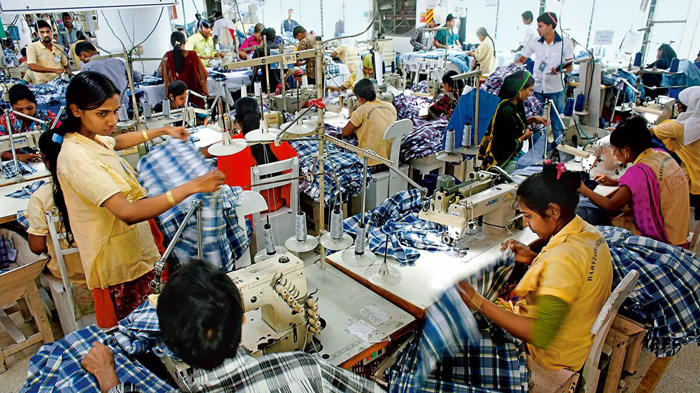
The American dream has long been stitched with visions of bustling factories and workers earning their fair share. But beneath the "Made in America" slogan lies a tangled reality, one where ethical production clashes with cost and convenience. Unravelling the complexities of ethical fashion, exploring the struggles of a small Maine-based manufacturer, the dark underbelly of the American garment industry, and the hopeful whispers of a future where fashion aligns with fairness, the story is beyond just patriotism, delving into the intricate web of economics, consumer choices, and the human cost of cheap clothing.
A Mission Stitched with Idealism
Ben and Whitney Waxman, the dreamers behind American Roots, embody the spirit of "Made in America." Their vision: to build a clothing company rooted in local sourcing, fair wages, and ethical practices. Yet, the path is fraught with challenges. Inexperience proves a cunning foe, leading them to navigate the treacherous waters of supplier scams and workforce management. But they persevere, bootstrapping their business to $3.5 million in sales by 2022, a testament to their unwavering commitment.
Beyond the Roots: A Critical Look at Free Trade's Legacy
Slade's gaze extends beyond American Roots, delving into the history of free trade and its impact on American manufacturing. Her critique is sharp, highlighting how free trade policies have led to a "massive upward transfer of wealth" and the hollowing out of American factories. Five million manufacturing jobs vanished between 1994 and 2013, replaced by service industries offering lower wages and fewer benefits. This shift has left America "unable to make what we need," Slade argues, creating a stark dependence on foreign production.
A Blemished Canvas: The Dark Side of American Fashion
However, the American garment industry itself is far from a shining example of ethical production. Piece-rate pay, rampant wage theft, and abysmal working conditions plague major hubs like Los Angeles. Even manufacturers praised by Slade are later revealed to lack basic employee benefits like health insurance. This stark reality exposes the hypocrisy lurking beneath the "Made in America" label, throwing its rosy promises into sharp contrast with the lived experiences of American garment workers.
Can We Mend the Fabric? A Quest for Ethical Production
The central question remains: can ethical fashion truly thrive within the existing American garment industry? Slade argues that simply shifting production back to the US isn't enough. "Absent broader changes," she warns, "a return to US manufacturing alone won't improve wages and conditions for American workers." The average LA garment worker, for instance, earns less than half minimum wage and often works grueling 60-70 hour weeks. These are not the conditions upon which a sustainable and ethical fashion industry can be built.
Beyond Borders: A New Vision for Ethical Manufacturing
So, where does that leave the "Made in America" dream? Perhaps the answer lies not in geographical borders, but in a global commitment to ethical production. Slade proposes a system of universal labor and environmental standards, one that transcends national origin and ensures ethical practices wherever goods are made. This vision extends beyond the limitations of "Made in America," offering a broader and more sustainable path towards a future where both American workers and consumers can benefit from ethical fashion.
American Roots: A Beacon of Hope, a Call to Action
American Roots, with its commitment to fair wages and local sourcing, serves as a beacon of hope within the American garment industry. However, its struggles and the challenges it faces offer a sobering lesson. The "Made in America" dream must evolve beyond slogans and patriotism. It requires a critical lens, a commitment to fair labor practices, and a vision for ethical production that stretches across borders. Only then can this dream truly translate into reality, weaving a new fabric of economic prosperity and ethical responsibility for all.
A Fork in the Road: Cost vs. Value
The siren song of "Made in America" beckons, but its melody fades in the face of reality – often a price tag significantly higher than its outsourced counterparts. Americans face a stark choice: embrace ethically produced, locally-sourced apparel at a premium, or stick with cheaper, globally-manufactured options, potentially overlooking potentially exploitative practices. Polls are mixed, revealing a complex tapestry of consumer behavior. On one hand, a 2023 survey by McKinsey & Company found that 68% of American consumers express a willingness to pay more for sustainable and ethical products. Yet, another study by Retail Dive suggests price remains the primary deciding factor for 72% of shoppers.
The Value-Conscious Consumer
Within this dichotomy lies a spectrum of shoppers. For some, like Gen Z with its heightened social and environmental awareness, ethical considerations outweigh cost. They prioritize brands like American Roots, drawn to its transparent practices and willingness to pay a fair price for quality, ethically-made garments. On the other hand, cost-conscious consumers, particularly those on tighter budgets, prioritize affordability. For them, the extra dollars associated with "Made in America" can be a hurdle, leading them to prioritize lower-priced options, regardless of their origin or manufacturing ethics.
Navigating the Divide
Finding common ground between these seemingly disparate groups is crucial for the "Made in America" movement to reach critical mass. Transparency remains key. Educating consumers about the human and environmental costs of fast fashion, coupled with highlighting the benefits of ethical production for both workers and the planet, can shift perspectives. Additionally, exploring ways to bridge the price gap through innovative business models, collaboration with local producers, and government incentives can make "Made in America" more accessible for a wider range of consumers.
Data Points and Statistics
• Five million American manufacturing jobs disappeared between 1994 and 2013.
• Average salary at American Roots in 2022: $47,000.
• Average LA garment worker's pay: less than half minimum wage.
• 60-70 hour workweeks are standard in LA garment industry.












